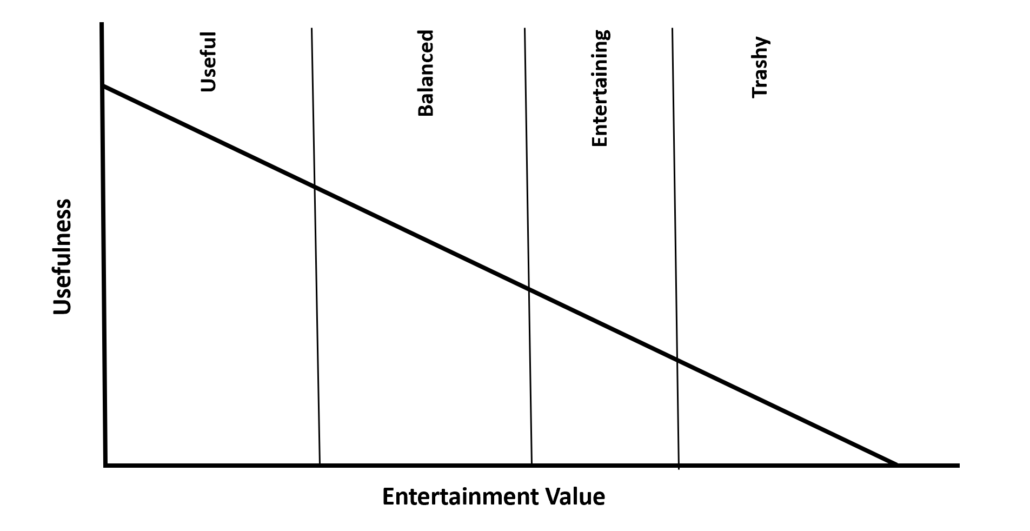It’s Not Easy Being a Hypocrite!

I have a confession to make.
This is embarrassing! Really embarrassing.
Look up “hypocrite” in Merriam Webster – you’ll find my name.
I signed up for Netflix this week!
I get it if you hit the unsubscribe button. You are legitimately accurate to claim “said blogger speaketh from both sides of mouth.”
You see, across numerous blog articles I’ve pilloried Netflix as the evil twin that teams with the La-Z-Boy to draw retirees into the dangers of sedentary living, mind-candy, and away from the treadmill and healthy brain activities.
How did it happen?
At the risk of sounding moderately Luddite, we just recently upgraded to a full-on smart TV. Not surprisingly, it came pre-loaded with Netflix and other black hole apps that need only our credit card number to activate and begin reducing the synaptic connections in our brains.
I will confess to also being less than my own man through this, having succumbed to the insistence of devoted (and now fellow) Netflixers that “you’ve got to watch this or that movie or this or that series or this or that documentary.”
To the credit of those pushing this button, the suggestions have generally been aimed at the 3-5% of Netflix that isn’t wasteland. So it was that my first venture into the swamp was a good one. I experienced the highly acclaimed and recommended “The Social Dilemma” documentary which should scare the s**t out of anyone whose brain hasn’t already been taken over by Zuckerburg.
But then, I slid into hypocrisy and wasted two evenings on three episodes of “Longmire”, only because my wife liked the books, we are from Wyoming, and Longmire is a sheriff in a non-existent town in Wyoming. He keeps busy staying sober and entwining himself in some pretty cheesy plots. Three episodes of cheese was more than enough and the rest of the series will go unwatched.
Here’s why I’m ranting and feeling guilty:
I have another problem: I’m on a heady personal mission that requires focus while I suffer from a near-terminal case of “shiny object syndrome.” Those two things, folks, don’t work well together.
As an obsessive learner and accumulator of knowledge (not to be confused with wisdom, the latter of which I’m still waiting to arrive) I’m drawn to every “shiny” article headline offered up by way too many sites I’ve subscribed to. Or to the new book title that somehow enters my attention stream.
Or, now, to Netflix.
I’ve “bragged” about reading over 700 books over the last 15 years (I stopped keeping track three years ago at around 700). You won’t hear that again because that too is embarrassing. I now realize I would be further ahead if I had taken the top 35 “life-changers” and read them 20 times each.
35 x 20 is focused growth. 700 is scattered and diluted attention.
700 books screams “procrastination.” Netflix does too.
This is all kinda raw right now because the Netflix decision happened just as I was finishing a book entitled “Hyperfocus: How To Be More Productive In A World of Distractions” (I’m already re-reading it!). The author, Chris Bailey, had me as his avatar when he wrote it – scattered, unfocused, distracted, diluted, unproductive – and proceeded to bludgeon me with examples of how I’ve allowed today’s world of distractions to slow my mission.
So I did the logical thing and validated Bailey’s research on why we are becoming less productive – I ordered Netflix.
My guilt should be self-evident.
Three hours of Longmire could have just as easily been three hours of sleep, 500-1000 words into one of the three books I’ve started, a back-patio conversation with my roommate of 50 years, 2-3 more Quora posts, some serious work on the driving range with my 22-degree hybrid.
You get the point.
Netflix versus Resurrection of Purpose
OK, so I’m over-zealous on this topic. Mindless relaxation has its place in everyone’s life – a way to recharge, to unwind, and relieve stress.
My concern – within my mission – is that we’re overdoing it, especially in the retirement years. Mounds of research have confirmed that the American male spends, on average, over 40 hours per week watching television.
Would we, if we put it up against this simple “productivity” graph extracted from “Hyperfocus?”

I understand. As we’ve progressed into our retirement years, we’ve been subtly convinced that we are tired, that we’ve earned the right to be unproductive for the first time in 40 years, that our capacity has diminished, that our brain has shrunk, that our synaptic connections have slowed, that work is something to leave behind in favor of ________ (fill the blank with the poison of your choice).
Netflix and its ilk know this better than we do. What’s not to like about a limitless selection of options for vegging for only $8.99/month? Mix in a voice-activated remote and a $1,000 La-Z-Boy and – voila – we are in neuron-shrinking heaven. It’s so easy, convenient, and comfortable, we forget to ask ourselves, as the credits roll: “How useful was this experience? Did it tilt toward useful or balanced or more to trashy? Did I move anybody’s needle, including my own?”
How much feel-good is there after 6 hours of Ozark?
The issue is bigger than Netflix
The issue isn’t Netflix – they are an easy scapegoat. The issue is losing track of, or failing to pursue, a meaningful purpose in what we’ve defined as the retirement years. The issue is failing to combine accumulated work and life skills and experiences with latent/dormant/suppressed talents and dreams to move the needle positively for generations that follow – or for a society that is off the rails.
Am I going to cancel Netflix and be “squeaky clean?” Not a chance – I’m already too deep in my hypocrisies and you are too smart an audience for that to do anything but backfire.
So, I’m going for “balance.” Veg out to something mindless after a productive day – or catching a documentary or series that will feed my passion for learning and teach me something new.
Yes, I’ll probably pig out on Ozark or do Breaking Bad front to back. And I’ll beat myself up for it. I’m not above confirming deep imperfection.
But I will no longer have to keep coming up with an answer to: “What? Why don’t you have Netflix?” I will have joined the “in-crowd” and be able to offer up a cogent argument to the next Longmire fan I encounter (if there is one out there).





BH
Hi
I enjoy your blogs.
I’m a preventive neurologist trying to cancel compulsory retirement.
The Netflix syndrome is probably one reason why people with higher religious well being are healthier and have less rapid cognitive decline. Some dont have TVs and have another source of meaning and purpose that doesn’t have to be filled in with purposeless TV.
See my article from Neurology, 1 May 2007.
Cheers
Y.
Thanks for your comment. Very interesting observation regarding those with higher religious well-being. Meaning and purpose certainly isn’t likely to pop off the Netflix screen. I’d like to know more about your mission of trying to cancel compulsory retirement – sounds like we share a common passion. I’ll dig up your article. Thanks for the recommendation.
Hi Gary, Very humorous this week! I have yet to join the Netflix challenge but there are 3 documentaries I have been told I need to watch on it. I haven’t given in yet. Mostly because I already pay Xfinity an obscene amount of money for perfectly good programs that I don’t watch either. Don’t get me wrong, I do watch TV, but it is my favorite programs that have been recorded and watched in half the time. I always enjoy your viewpoint as it reminds us we are all humans with imperfections, even funny ones.
Thanks Sally – I’m feeling a little better about Netflix after two years of surfing through the Xfinity wasteland to only occasionally come up with a worthwhile show. We’ll see where this all goes.
Much like eating to have a healthy diet, the same goes for what you choose from the Netflix menu
Try the Last Tango in Halifax series on Netflix. It explores aging, retirement, and family issues in a thoughtful way!
https://youtu.be/VfUk-V739RA
Spot on, John. Thanks for the reminder. I found the Last Tango and have it on my preferred list – thanks for the recommendation.
Hi Gary, I don’t think subscribing to Netflix is a problem at all. It’s fun! There are so many outstanding shows available on TV these days. You mentioned Breaking Bad. That was awesome. I also recommend Better Call Saul, Breaking Bad’s prequel, although it’s on a break because of the pandemic.
I am 62 and have my own bookkeeping practice. I feel I have solved the issue of going into decline as I’m getting older. I have so much work, and it’s pretty stressful. But, I can see doing this work and serving society until I’m physically and mentally unable.
But, my point is that I love watching good TV shows, and my favorite sports teams. It’s fun. And, I love having fun. I don’t think there’s anything wrong if every action of our lives is not productive or purposeful.
Thanks, Reza. I’m pretty tongue-in-cheek with this article. I appreciate and endorse your perspective. I absolutely loved Brian Cranston and the several episodes of Breaking Bad despite I watched despite the darkness. I’ll no doubt get sucked back in now that I have Netflix. My challenge is to do what you are doing – working it in once the purposeful, productive, life-mission work is done and not in place of it. I’ve already enjoyed a few documentaries on the body and brain while on that boring treadmill.
Thanks for taking the time to comment
You have motivated me to picking up a book before the TV remote. Can you give a list of the top “10 Books” that you have found to be the most valuable in your life?
Wow, Paul. That’s a tall order but I’ll give you what comes to my mind first:
1. Younger Next Year, Live Strong, Fit, and Sexy – Until You’re 80 and Beyond (easily the most influential book for me dealing with health)
2. Anything by Steve Chandler, but especially “Fearless” and “The Story of You.”
3. The One Thing, by Gary Keller
4. Dare to Be 100 and The Roadmap to 100 by Dr. Walter Bortz
5. The Slight Edge, Jeff Olson
6. Life Reimagined, Barbara Bradley Haggerty
7. Anything by Seth Godin (marketing)
8. Deep Work, Cal Newport
9. Atomic Habits, James Clear
10. Hyperfocus, Chris Bradley (reading now for second time hoping this will be antidotal for my shiny object syndrome).
11. Bonus – Mindbody Code and MIndbody Self by Dr. Mario Martinez (rather heavy, sloggish reading but provocative stuff.)
Obviously, I’m heavy into self-development and health and wellness.
Thanks for asking. I’d love to know what your top 10 list is.
Hello Gary,
You have touched on a number of issues near and dear to me, not the least of which is the sense of entitlement to pursue an aimless life in retirement. In my opinion, we need everyone to contribute their talents and strengths to the best of their abilities at all ages to make the world a better place. I am a proponent of #retireretirement for that reason.
To your list of books may I suggest adding psychologist James Hollis’s Living an Examined Life. Wisdom for the Second Half of the Journey. As a Jungian psychologist he gets to the roots of our less than stellar behaviours. My review of his book can be found at nextinlife.ca His writing is at times heavy yet he asks questions like “Where do you need to grow up?” which has relevance regardless of age. And asks us to consider have we ever created our own agenda for our lives. Thought provoking reading.
Stefa
Hey there! I could have sworn I’ve been to this blog before but after reading through some of the post I realized it’s new to me. Anyhow, I’m definitely glad I found it and I’ll be bookmarking and checking back frequently!
Hello makeagingwork.com administrator, You always provide clear explanations and definitions.
Hi makeagingwork.com admin, Your posts are always on point.
Hi makeagingwork.com administrator, You always provide great examples and real-world applications.
Hi makeagingwork.com administrator, Your posts are always well researched.
Dear makeagingwork.com owner, Your posts are always insightful and valuable.
Dear makeagingwork.com webmaster, Thanks for the great post!
Dear makeagingwork.com webmaster, Your posts are always well-timed and relevant.
Hello makeagingwork.com webmaster, Your posts are always well-delivered and engaging.
Hello makeagingwork.com owner, Your posts are always well organized and easy to understand.
To the makeagingwork.com administrator, Your posts are always well-written and easy to understand.
Dear makeagingwork.com owner, Thanks for the informative and well-written post!
To the makeagingwork.com webmaster, Your posts are always well-received and appreciated.
Hi makeagingwork.com owner, Your posts are always well-written and engaging.
To the makeagingwork.com webmaster, Keep it up!
Dear makeagingwork.com webmaster, Great job!